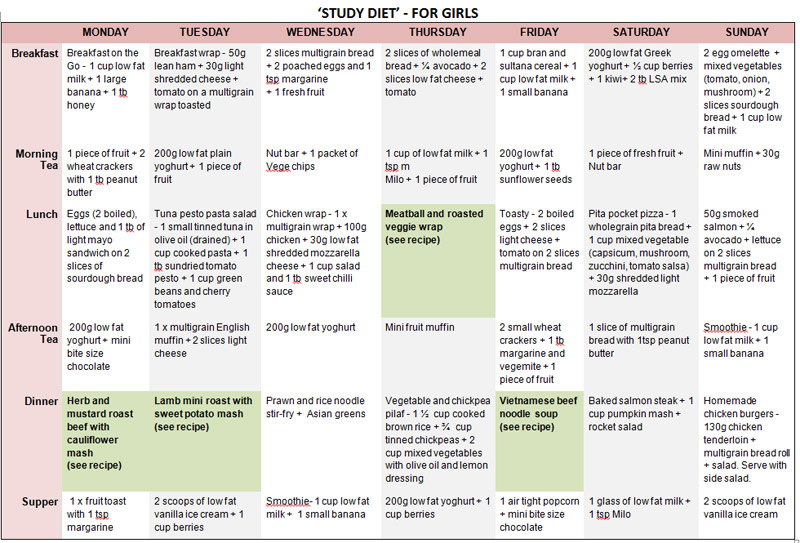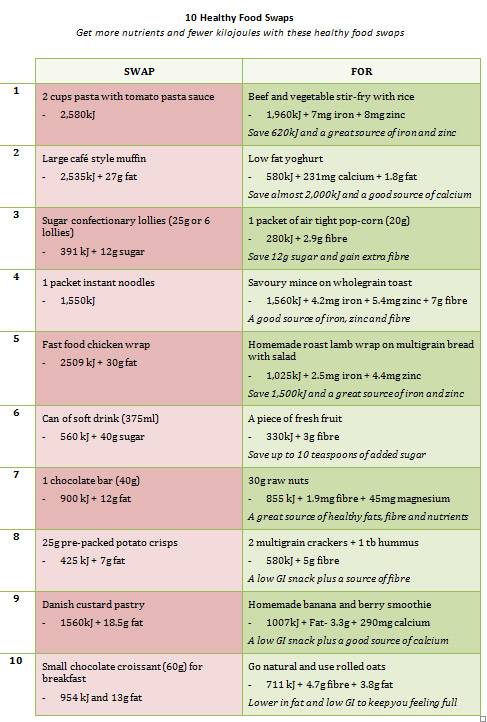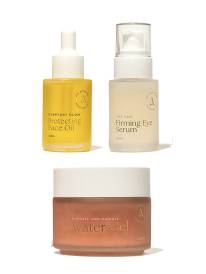Geraldine Georgeou Study Diet Interview

Geraldine Georgeou Study Diet Interview
As over 250,000 students across Australia commence preparation for the most important exams of their lives, it's more often than not the parents feeling the stress! While we can't sit the exams for our students or help them with their study, we can provide the right foods to fuel their minds and bodies.
Accredited Practicing Dietitian Geraldine Georgeou (Designer Diets), together with www.themainmeal.com.au, has developed a 'Study Diet" specially tailored to meet their nutritional and lifestyle needs.
The 'Study Diet" is high in nutrient-rich protein foods with low GI carbs providing essential nutrients to fuel body and mind, including iron to produce energy for brain function and zinc for a healthy immune system.
Separate meal plans for teenage girls and boys have been designed to ensure -yum' appeal.
Tips for managing exam stress, learning overload and fatigue are provided, with detailed food choices for breakfast, lunch, dinner and numerous snacking options throughout the day. Eating the right foods can be the first step towards study success!
'It is important to ensure your student has enough iron. Low iron stores can cause tiredness, lethargy and may make it difficult to concentrate and study. Research suggests improvements in concentration, memory and learning are seen when iron levels are corrected.
Zinc is an important nutrient for a healthy immune system. Low zinc stores may increase susceptibility to colds and infections.
Beef and lamb are excellent sources of well absorbed iron and zinc. Including beef and lamb 3-4 times a week in your study diet, helps maintain healthy levels of iron and zinc for everyone in the household," said Geraldine.
The Study Diet is packed with essentials nutrients and delicious recipes that the whole family will enjoy.
For recipes see: www.girl.com.au/study-diet-recipes

Top 10 Tips for Parents
1. Eat breakfast. Skipping breakfast can make your student feel light-headed and lose concentration; on exam day provide a healthy breakfast packed with protein and low GI carbs e.g. eggs on grainy toast, porridge with reduced fat milk, fruit and nuts or high fibre cereal with reduced fat milk and chopped banana. This will keep them fuller for longer and improve their concentration throughout the day.
2. Include nutrient-rich protein foods such as beef and lamb 3 to 4 times a week to help meet iron and zinc requirements. These micronutrients help produce energy for brain function helping with concentration and learning. Protein-rich foods are also filling so you feel fuller for longer. Utilise left overs from last night's dinner for lunch the next day e.g. roast beef or lamb in a wrap or salad for lunch.
3. Stay hydrated. Make sure your students stay hydrated, especially during the warmer weather. Dehydration affects the brain and hence academic performance. Encourage water breaks, provide a water bottle for school and limit the availability of fizzy/energy drinks.
4. Support healthy snacking. Avoid sugary junk foods and fizzy drinks as while they provide a quick fix of energy they will leave your student feeling sluggish and tired after a short period. Support healthy snacking at home by keeping a plate of fresh cut fruit in the fridge and stock the pantry with nuts, seeds, wholegrain crackers and low fat yoghurt. If your student is not a fruit eater try offering a homemade smoothie. For a filling snack, try a toasted sandwich with roast beef or lamb to keep your child energized throughout the day.
5. Go low G.I. Low GI foods are 'smart carbs" that your body will slowly digest and absorb, resulting in only a small rise in your blood glucose levels, giving you longer lasting energy. Further, adding protein to your meal such as beef, lamb, chicken, fish or eggs, will also help sustain your energy for longer. Swap your bread to either a soy or linseed, grainy or sourdough bread. Try adding legumes such as lentils or beans to a beef casserole or salad. Choose lower G.I. grains such as basmati rice, bulgur or quinoa.
6. Encourage good sleeping patterns, aiming for a minimum of 8 hours sleep, by eliminating high caffeine containing foods and drinks in the evening e.g. soft drinks and chocolate. Try herbal infusion teas like peppermint or ginger which are a great alternative without caffeine.
7. Get active outdoors. Make sure your student has some study free time to relax, unwind and recharge. Regular physical activity releases endorphins which help improve mood and reduce stress. Encourage outdoor activities such as walking the dog or playing football or basketball with friends during study breaks rather than sedentary activities such as watching TV or using mobile devices and social media.
8. Don't miss meals. During stressful times it is easy for students to let time slip away and forget to eat meals. Make sure there are plenty of healthy snacks and quick meals available in the home such as savoury mince or baked beans on toast, a burrito or wrap, nut bars and breakfast cereal. Missing meals can lead to negative effects such as fatigue, loss of concentration and tiredness; all which are necessary for studying and performance.
9. Set a daily routine. Helping your student establish a daily routine with regular study periods, meal times and breaks for physical activity or time with friends may help reduce stress and avoid -cramming' the night before a test. Help them set study milestones and reward them for achieving short and long term goals.
10. Boost happiness. Laughter can help you feel good and research suggests happiness is linked with increased serotonin levels. Serotonin is a chemical in the brain that is known to reduce stress and provide a calm feeling. Certain foods, such as milk and bananas can increase serotonin levels.
For more tips, advice and nutritious recipe ideas, visit www.themainmeal.com.au
Interview with Geraldine Georgeou
Question: What inspired you to create the Study Diet?
Geraldine Georgeou: In private practice I see a lot of people in reference to the best diet, for them to have good energy and particularly stamina during HSC. Many teenagers, both boys and girls, don't meet their iron, omega-3 or protein requirements and often forget to eat! I wanted to share the diet plan, with the nation, rather than individually.
It was really fun to do the Study Diet meal plans as I provide this to a lot of my patients but particularly those studying. It is very hard as a parent to watch your child trying to perform and providing optimal nutrition is one of the best ways of supporting them.
Question: How does the Study Diet meet teenagers nutritional and lifestyle needs?
Geraldine Georgeou: The diet plan includes a balanced diet of good protein, low GI carbohydrates, good fats and important nutrients iron, omega-3 and zinc.
Question: Why is there a different Study Diet for a male and a female?
Geraldine Georgeou: Girls have different energy requirements to boys. Females naturally have a higher iron requirement and you'll see in the Study Diet meal plan that for both boys and girls we have the adequate serve of lean red meat two to three times a week but we particularly encourage girls to include lean red meat in their lunches as well with recipes such as the Meatball and Roasted Vegie Wrap.
For the boys, outside of getting enough lean red meat and protein we've also included more food and calories in their Study Diet because they can naturally be more active; however there are a lot of girls playing sports, nowadays.
Question: What are the most important foods for teenagers to consume when studying?
Geraldine Georgeou: The first thing is both girls and boys need to eat breakfast and try not to skip breakfast even though nerves can get you! Breakfast can be quick and easy on the go like having a smoothie with banana, honey and low fat or reduced fat milk. However, don't forget the big breakfast of eggs, lean bacon, tomatoes and sourdough or multigrain bread!
If you break it down to each meal you have to make sure each meal has a good source of protein (dairy milk, low fat cheese, eggs, salmon, chicken and lean red meat) incorporated such as a vegemite and cheese sandwich for example.
Question: How important is snacking, when studying?
Geraldine Georgeou: It's important to have very good snacks in the cupboard or fridge including those rich protein foods. Nuts and seeds can be great foods to just grab from the cupboard or yoghurt or even wholegrain crackers and cheese is a really good snack.
Snacks at night are very important because students are doing one-night wonders when they're trying to cram that last bit of knowledge into the head before the exam; I can't think of anything nicer than a piece of fruit toast and a glass of milk!
A lot of HSC students are thinking about their formal as well as their exams and maybe thinking about not having carbs (carbohydrates) after 4pm but that is a death wish! You can't study or get to the formal without eating carbs! It is important to eat a balance of carbs, protein, good fats throughout the day.
Question: How important is swapping high sugar treats for low GI snacks?
Geraldine Georgeou: We've all eaten bags of lollies when we're trying to study but all that does is give a quick burst of energy. Swap high sugar treats for low GI snacks such as wholegrain toast with peanut butter on it and a glass of Milo because that will be a much more sustaining snack that lasts for three or four hours with low GI slow release carbohydrates. Slow release carbohydrates means it gives you that longer feeling of fullness and you won't be distracted by hunger and your retention of knowledge and concentration should be much better.
Question: How does iron aid in concentration?
Geraldine Georgeou: Iron helps 100% with concentration; eating enough food source iron helps reduce fatigue and tiredness whilst also promoting a good immune system. You need to get iron that is absorbable which is why the Study Diet meal plan focuses on at least three serves of lean red meat, per week.
Question: What other vitamins and nutrients are important during this time?
Geraldine Georgeou: Zinc is very important and that comes from animal proteins, nuts and grains. Omega-3 is also important which is found in fish or grains, Omega-3 is very important for energy, concentration, reducing fatigue and reducing the drop in immune function. There have been a number of studies that report those three main nutrients, vitamins and minerals (Zinc, Omega-3 and Iron) aid in helping good health and wellbeing during the stressful time, in a teenagers life.
Question: What can parents do to help their teenagers, during exam time?
Geraldine Georgeou: The first thing is that parents need to be very encouraging as often teenagers can be very stressed, don't want to eat or don't know what they want to eat. It is a good idea to show them the Study Diet meal plans and let them have a look through it to see if they do like the ideas and then have the food available. Parents need to also encourage their child to eat breakfast and ensure they are having a good choice of protein with each meal and keep healthy snacks available at home so they are not likely to have nothing or a snack that won't last the distance. It's important to encourage activity outdoors as Vitamin D is important as is the mental study break to allow unwinding and recharge.
Parents need to encourage their child not to miss meals because like a car they need to top up every three to four hours and if they don't top up they'll experience negative effects of fatigue and loss of concentration; a regular top up is important!
Question: What is the best breakfast for a teenager to consume, prior to a lunchtime exam?
Geraldine Georgeou: I think one of the best breakfasts is egg on toast because it lasts the distance. However have a look at what foods are your go-to or comfort foods such as porridge; if you are having cereal choose a good grainy cereal that is not full of sugar because they won't last as long. I favour the eggs on toast, though!
Interview by Brooke Hunter

MORE





